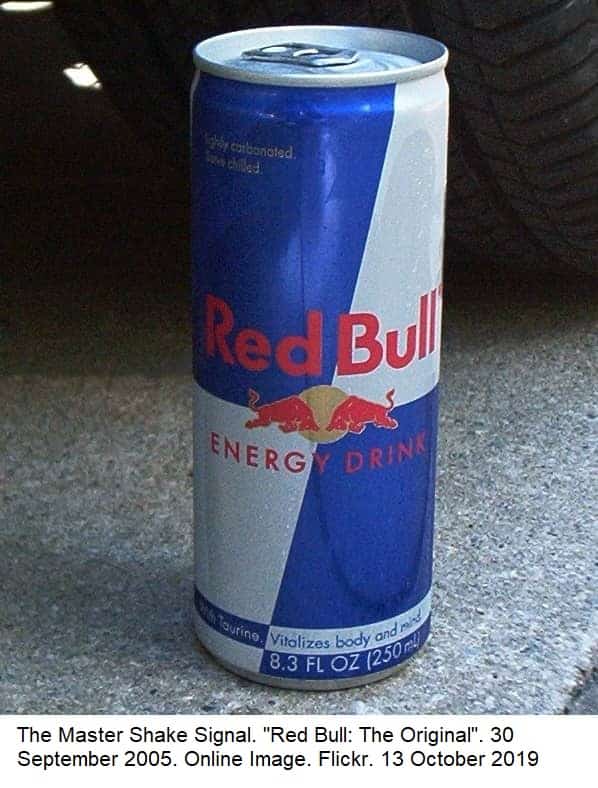Red Bull is a popular energy drink sold in a tall slim blue-silver can. It’s a favorite alternative for those who need a caffeine fix but don’t like coffee or tea. It’s also convenient. It’s been around since the 1980’s so a lot of vegans and vegetarians grew up drinking the stuff and want to know if they can continue to do so after switching to a plant-based diet.1
Is it vegan or vegetarian? Yes, Red Bull is both vegan and vegetarian. It’s a combination of carbonated water, simple sugars, salts (sodium bicarbonate, magnesium carbonate, calcium pantothenate, etc.), vitamins, colors/flavors, and energy-releasing substances (e.g. taurine and caffeine). None of which are of animal origin.2
What we’ll do here is get into why each of the aforementioned ingredients qualifies as vegan. By the way, if something is suitable for vegans, it’s by definition suitable for vegetarians (not the other way around). So, we’ll be using the term vegan for the rest of the article.
Why Red Bull Is Generally Considered Vegan
Taurine In Processed Foods Is Vegan
This hasn’t always been the case. Like with essential micronutrients, it used to be extracted from natural sources (read: animal tissue), but it’s much less economically feasible to derive the ingredient this way when there are ways to produce the compound synthetically.
Compounds like caffeine and taurine are used in so-called “smart beverages” which are marketed as being able to boost alertness and concentration.3
Some compounds that have long been claimed to boost brain power are commonly added to drinks sold as “smart” beverages—despite there being very little to no research support such claims. While there is some research behind specific compounds (especially caffeine), very little (if any) has been performed on specific drinks that boast of having a beneficial combination of just the right ingredients.
Substances commonly added to smart drinks that are said to potentially stimulate mental activities include “amino acids” like taurine, phenylalanine, choline, and L-cysteine.4
I use quotes because taurine isn’t technically an amino acid, though it’s usually referred to as such. It’s actually an amino sulfonic acid.5
I’m not saying that all taurine is vegan, but the form of taurine used in energy drinks and supplements is usually made via chemical synthesis (without animal-derived precursors) and thus suitable for vegans and vegetarians.6,7
The Presence of Sugar Does Not Render a Food Non-Vegan
At least, by most standards. There are some extra prudent vegans who like to avoid any processed foods made with non-organic sugar because organic sugar is never processed with bone char.
But, even PETA states that avoiding foods containing processed sugar is going above and beyond the call of duty for most vegans. In their article, Is Sugar Vegan?, they say not to stress too hard if you’re not sure how sugar in a given food product is produced.8
They seem to make the case that it could send the wrong signal to folks who are considering becoming vegan if they see that you stress so hard about ambiguous ingredients—i.e. ingredients that can be vegan if produced in this way, but are non-vegan if produced in that way.
That’s my paraphrase anyway. I don’t know that I personally agree with that. If you feel convicted about consuming non-organic sugar due to the potential use of bone char in its processing and want to avoid the stuff, I think that’s great.
But, it’s definitely not expected of you, that as a vegan, you have to avoid most sugar-containing foods. I personally don’t buy non-organic sugar (in bulk for cooking, home use, etc.), but I don’t go out of my way to avoid processed foods containing sugar. But, that’s just me. Each to their own.
The B Vitamins in Red Bull Are Vegan
Up until a few decades ago, most of the vitamins added to fortified foods and supplements were were extracted from matter that naturally contained the nutrients. Manufacturers would extract concentrates or extracts from natural vitamin-rich food sources.
Sometimes they were vegan sources, and other times not so much. This still goes on today to an extent, with vitamins A and D which are often delivered in the form of cod liver oil.
In recent times, the development of newer technologies has allowed food and supplement manufacturers to synthesize vitamins, which has turned out to be more economically feasible than trying to derive the nutrients from their natural sources.
Reasons for opting for synthetic vitamins include:9
- The synthetic kind are much cheaper
- The scarcity of vitamins in natural sources, relative to what can be produced synthetically
- Better taste and smell of synthetic vitamins
- Better shelf-life
- Less nutrient loss during the extraction process
- Less damage to the molecules over time
Some vitamins, like vitamin D, continue to be extracted—vitamin D is derived from a substance known as lanolin found abundantly in sheep oil. But, Red Bull makes use of B vitamins—specifically Vitamin B3 (niacin), vitamin B6 (pyridoxine), and vitamin B12 (cobalamin)—which are pretty much always synthetic.
Niacin can be produced by a combination of microbial and chemical processes.9
Vitamin B6 or pyridoxine is made microbially or chemically from non-animal derived precursors.9,10
Finally, we have vitamin B12, which is exclusively produced via microbial fermentation, so synthetic B12 in fortified foods and beverages is always considered vegan.9
That’s it for the vegan status of Red Bull. Thanks for reading.
You may also want to check out the following related articles:
References
- Giving Wings to People and Ideas. https://www.redbull.com/us-en/energydrink/company-profile
- (12 Cans) Red Bull Energy Drink, 8.4 Fl Oz. https://www.walmart.com/ip/12-Cans-Red-Bull-Energy-Drink-8-4-Fl-Oz/10316267
- Understanding Food: Principles and Preparation (Page 554). Amy Brown – Wadsworth Cengage Learning – 2011. ISBN-10: 0-538-73498-1
- Hollingsworth P. Redefining New Age. Food Technology 51(8):44–51, 1997.
- Taurine, Compound Summary. Pubchem. US National Library of Medicine. https://pubchem.ncbi.nlm.nih.gov/compound/Taurine
- What Is Taurine? Benefits, Side Effects and More Rudy Mawer – https://www.healthline.com/nutrition/what-is-taurine
- Kosswig, K. (2000). “Sulfonic Acids, Aliphatic”. Ullmann’s Encyclopedia of Industrial Chemistry. Weinheim: Wiley-VCH. https://onlinelibrary.wiley.com/doi/abs/10.1002/14356007.a25_503
- Is Sugar Vegan? https://www.peta.org/living/food/is-sugar-vegan/
- Jose L. Revuelta, Ruben M. Buey, Rodrigo Ledesma‐Amaro, and Erick J. Microbial biotechnology for the synthesis of (pro)vitamins, biopigments and antioxidants: challenges and opportunities. Microb Biotechnol. 2016 Sep; 9(5): 564–567. https://www.ncbi.nlm.nih.gov/pmc/articles/PMC4993173/
- Y. Tani. Microbial Production of Vitamin B6 and Derivatives. Biotechnology of Vitamins, Pigments and Growth Factors pp 221-230. https://link.springer.com/chapter/10.1007/978-94-009-1111-6_13

